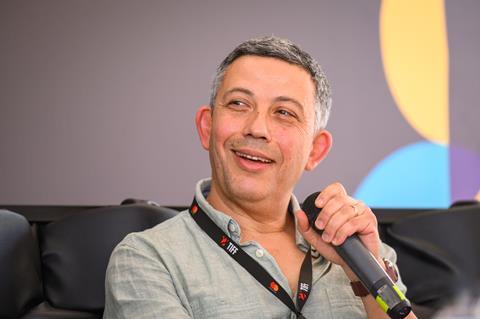
As one of the three recipients of the 3x3 homages at the Transilvania International Film Festival (TIFF) this month, Romanian documentary director, DoP, producer and screenwriter Alexandru Solomon relished the chance to reflect on how filmmaking in Romania has transformed in the past 30 years.
He has been as the forefront of that transformation as the husband and producing partner Ada Solomon of Hi Film and the collective outfit microFILM.
“I was very illiterate in documentary when I first started because what I could see in Romania at the time was very limited,” Solomon explains. “We had the Astra Film Festival from 1993 and the Romanian Cinematheque from the communist times, so I got to know the Polish filmmakers and obviously the Russian films, but it was all much older stuff. It meant that I didn’t discover my documentary culture until much later - at the end of the 90s and 2000s. I’m still filling in some gaps.”
After training at the film school in Bucharest as a DoP, Solomon initially worked on more experimental work and collaborated with Radu Igazsag. “Gradually I moved to subjects that were more socially and politically motivated.”
“At the same time, I’ve kept this idea of mixing tools and layers of fictionalised and fantasised narratives in my films,” he adds.
The concept has translated to the new What’s Up Doc Award? documentary competition at TIFF this year, which has blurred the line between fiction and doc narratives. Solomon was on the jury.
“We are living in times of conspiracy theories and all this distrust in images. You can’t trust anything anymore,” he observes.
For the 3x3 homage - of which Solomon was one of three subjects, along with directors Ildikó Enyedi and Gaspar Noé - he worked with TIFF artistic director Mihai Chirilov to choose the three films to play. They selected 2006’s Clara B, which recreates the imaginary life of a woman photographer and reporter born in 1901 using real photos and archive material, 2007’s Cold Waves, about Radio Free Europe during the 1980s, and 2017’s Tarzan’s Testicles, focusing on a Stalinist medical institute in Abhazia researching on the creation of a human-monkey hybrid. Tarzan’s Testicles played in Karlovy Vary’s documentary competition in 2017.
Working with Ada
Solomon had been developing his documentary projects including Kapitalism Our Improved Formula, Apocalypse On Wheels and Tarzan’s Testicles under the roof of the production company Hi Film Productions which his wife Ada set up in 2004. But his latest project - Arsenie. An Amazing Afterlife - exploring the cult of a new saint Father Arsenie Boca - is being produced by the boutique collective company microFILM which has brought husband and wife together with young women producers Carla Fotea and Diana Pariou.
microFILM’s recent successes include Ivana Mladenovic’s Locarno 2019 prize-winner Ivana The Terrible and the Golden Bear for Radu Jude’s Bad Luck Banging Or Loony Porn at the 2021 Berlinale. Next week will see the world premiere in Karlovy Vary of the company’s minority co-production of Polish filmmaker Tomasz Wasilewski’s latest feature Fools.
“Ada is the one responsible for all the productions,” Solomon explains, “What I can do in terms of production is to discover a documentary project and then accompany it to a more from a creative angle.”
He points to Hungarian filmmaker Robert Lakatos’ Whose Dog Am I? which generated a very positive buzz from festival programmers and sales agents following a private screening during Romanian Days, as well as the Ukrainian-Romanian co-production of Helena Maksyom and Adrian Pirvu’s Everything Will Not Be Fine, and documentaries by Xandra Popescu (Ion) and Paula Onet (Still Nia). The latter two are now at the editing stage.
Solomon says he does not harbour any concrete ambitions to move into fiction projects as a director, but he has made the occasional foray as a DoP, most recently, for Valentin Hotea’s Lebensdorf in and Stefan Constantinescu’s debut feature Man And Dog which screened in this year’s Romanian Days strand at TIFF. Both shot during the pandemic.
“Being the DoP on a fiction film means you are less responsible in a way for the whole film,” Solomon suggests. “During the pandemic when we shot these two films, it was a time when I felt like I was coming back to the old tools and focusing on the visuals. Moreover, I was working with two friends. I knew that this was just a brief window and then I’d be going back to my usual work.”

























No comments yet